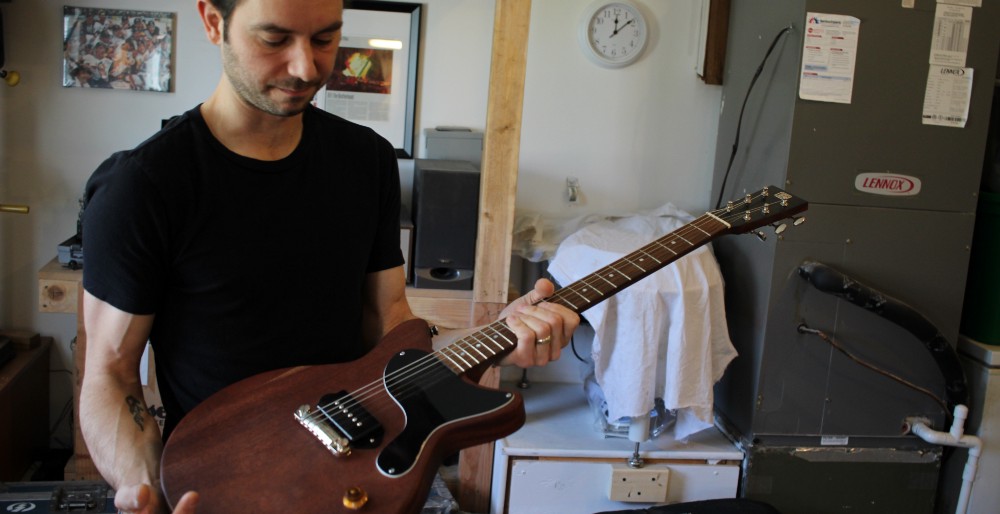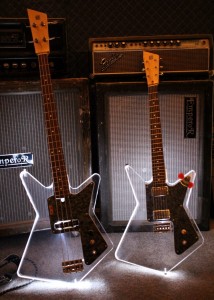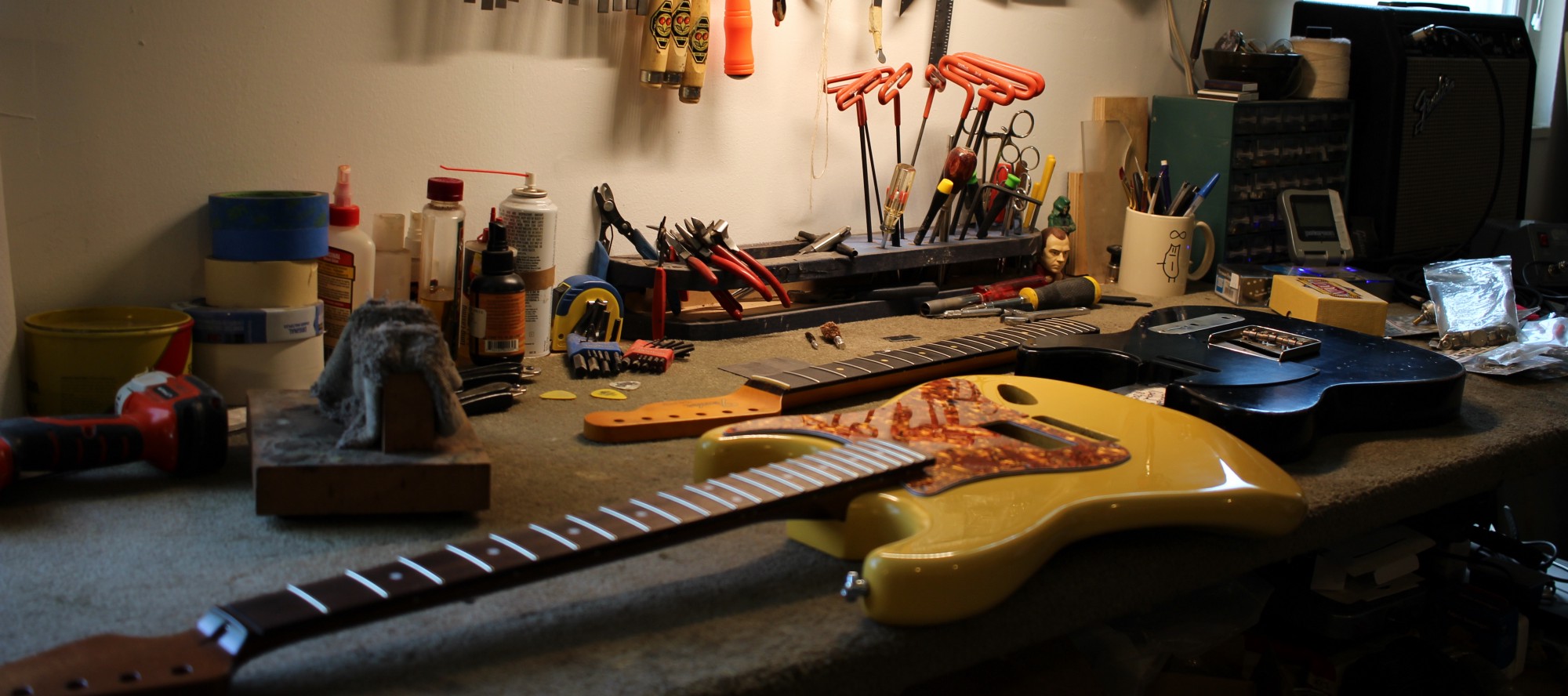Like most of us who grew up playing in scruffy bands with more attitude than talent, I dismissed almost all sensible care of my instrument, my hands, and my ear drums as selling out. Growing up in an industry town (Nashville) only strengthened my commitment to do the opposite of whatever those people with rhinestones on their jeans were doing. I left strings on my guitar until I broke one. Then I usually only replaced the one that broke. I took my guitar to the shop only when something was wrong with it. My Squier Super-Sonic smells smells kinda sweet but stinky. I call her The Sweaty Lady because “The Guitar the Cat Pissed On” doesn’t have the same ring to it. It hardly seemed worth the trouble or the money to keep in shape.
The Good Advice column is all about sharing the tips that sustain the creation of music. Badly-intoned, pissed on, punk rock guitars are great for a period in your life but when you want to make music continuously, you need a reliable instrument. Just because you bought your guitar for cheap in a pawn shop doesn’t mean it can’t be reliable and intoned.
I spoke with Dave Johnson of Scale Model Guitars about the importance of getting your guitar set-up. Dave is no stranger to the punk rock, DIY ethos. He is a mostly self-taught technician who does repair at Carter Vintage Guitars in Nashville, Tennessee, and does set-ups and custom builds in his own shop. He also plays guitar in the band Scale Model.
We started by discussing the two groups of players who might avoid set ups: “the new player” and “the punk.”
What would you tell the new player about the importance of setting up a guitar?
My very first guitar when I was in grade school was a budget brand acoustic with the action set so high that it was actually painful to play above the third fret. Some people believe that a new player should have to “pay their dues” on their first guitar, with action way too high and maybe painful on the fingers. Some people think that cheaper beginner guitars “just play like that” and that’s a part of learning. This can be very discouraging for a new player or kid who is excited to get playing, and is not acceptable in my opinion. After all, learning to play should be a lot of fun.
Yes, steel strings on fingers can be uncomfortable at first, but it shouldn’t be so painful that it is nearly impossible. Most any guitar shop can cut down a bridge or make a couple of quick adjustments that will make a budget guitar play way better and easier, and it shouldn’t be all that expensive. After all, they want to encourage you to play and earn a new customer. I’ve been working in guitar shops for nearly two decades and I still love to watch a kid light up after making their cheap guitar play great!

What about the DIY players who favor a beat-up or cheap guitar for its tone or attitude and don’t necessarily get them set up?
I would say there is nothing wrong with that until it becomes a problem. Some of my favorite songs were written by people playing cheap, beaten-up gear. After all, it is the player that makes a guitar sound great, and a super-talented guitar player can make just about anything sound great.
However, if you haven’t had your guitar setup in a while and you have a problem keeping it in tune when recording, that can be a big problem. In the studio, that clock will be ticking and you will be under the microscope. If you keep flubbing the same riff in the same song over and over again because your action is set way too high, your bandmates are going to get tired of it. If the nut slot on your low “E” string is cut way too low and every time you play an open chord it sounds like a sitar…you get my point!
Let’s dig into specifics. What does a “set up” entail?
A set up is not a “repair” but rather an adjustment to a guitar’s neck, bridge, and nut for improved playability and tuning. More specifically, an adjustment to a guitar’s action (how high the strings are off of the fretboard), and intonation (how well a guitar holds it’s tuning all the way up and down the neck).
I know that one of my most frequent repair requests (that would have been settled by regular set ups) was that my action was too high or low (and causing strings to snap by my ham-fisted tremolo bar technique).
A guitar’s action can be setup high or low (or somewhere in between) depending on personal preference. It is the job of the guitar tech to make sure that the instrument will play in tune and stay in tune at that preferred action height, and also play clean and even without any string buzzing or “splatty” notes.
What’s a good way to tell when you need a set up?
If you have ever tuned a guitar’s open notes to perfection with a tuner, but the instrument still doesn’t hold tune as you play up the neck then your intonation might need to be adjusted. Unlike on a piano (where each individual string is tuned independently of the others), or a violin (which is fretless and intonated by the player while playing) a fretted instrument will only stay in tune all the way up and down the neck if the intonation at the bridge is set correctly.

A set up is more than just fixing intonation. What else does a technician do in a “set up”?
Tightening hardware, tuners, knobs, strap buttons. Cleaning the electronic components like the switches, input jack, and potentiometers. Raising or lowering nut slots so the open notes ring true over the first fret. Oiling the fretboard and polishing the instrument. I still think that a clean guitar plays better!
Should you get a guitar set up as soon as you buy it?
Not necessarily, if the guitar is already playing great and stays in tune then there is no need. However, sometimes even a new guitar will need to be setup if it has been hanging out a while or has gone through a season (and humidity) change. Most stores should be able to adjust a guitar for you at the time that you buy it. If one has an issue playing clean or staying in tune and they aren’t able to quickly adjust it for you then it wouldn’t be out of the question to factor the setup cost of a reputable guitar tech into the sale price. Who wants to buy a new or “new to me” guitar and have it not play correctly once you get it home?
How often should a guitarist get a guitar set up? Does it differ for basses?
Guitars and basses are really no different. Most techs would tell you twice a year if it is your main player. This is because of season (and humidity) changes. Since most guitars are made out of wood, a guitar neck will expand and contract with the changing seasons. This can affect the amount of neck relief that is suitable for making a guitar play evenly and comfortably. Newer guitars commonly have an adjustable neck, the amount of curvature in the neck (neck relief) can change with the humidity changes of summer to winter.
The first thing that I look at when setting up a guitar is the amount of neck relief. If the neck is back-bowed then you risk string buzz and fret noise, “splatty” notes. If the neck has too much relief then the action will become very high, especially in the middle of the neck. Also, things can fall out over time. Bridge saddle screws can move, nut slots can wear down, pickups can release themselves from pickguards…basically, a set up doesn’t last forever because things do move.
I would say if it is your main guitar, it is a good idea to keep on top of it. You’ll know when something isn’t right.
What do you think holds people back from setting up instruments?
Time and money, without a doubt. There are a lot of people who have several guitars, but most people have their “number one” and just don’t want to be without it for very long.
Whenever you need to get a guitar set up quickly, it is a very good idea when you take it to a shop to ask the tech(s) how backed-up they are. Some shops charge rush fees if you need it fast.
Personally, through both the store that I work at and my home shop I just use the honor system. If you need it back quickly, or even on the spot, then just speak up and I’ll bump you to the front. I’ve been using this system for years now and it works great. Most people aren’t in a hurry, but if you are then we need to take care of you. Have you ever had a neck shift on you while out on tour and you’re only in town for one day? Not fun. I’ll get your back.
Money is the other factor. There is an old saying in the service industry; good, fast, cheap — you get to pick two. I like to try and be the exception, but the reality of playing music is that gear maintenance almost always takes a back seat to recording, touring, making merch/records. Asking a touring band to pay for a guitar set up when they need to have enough gas money to make it to the next show is sometimes a pretty big deal. For this reason, most people put it off.
You certainly don’t have to set up a guitar like clockwork twice a year if it doesn’t really need it, but it isn’t a bad idea to stay ahead of it. I always tell the bands that I do work for to budget for it as if it were a recording expense, or touring expense (especially on a longer tour). It’s way easier to have it done before you leave than while you’re out, and no one likes surprises out on the road or in the studio. Just find a tech that you personally like who does good work and build a good relationship. There are literally hundreds of great guitar shops all over, you’ll find someone who does you right!












































Comments
No comment